Gordon Grice's Blog, page 58
April 26, 2012
New Zealand: Elephant Kills Zoo Owner
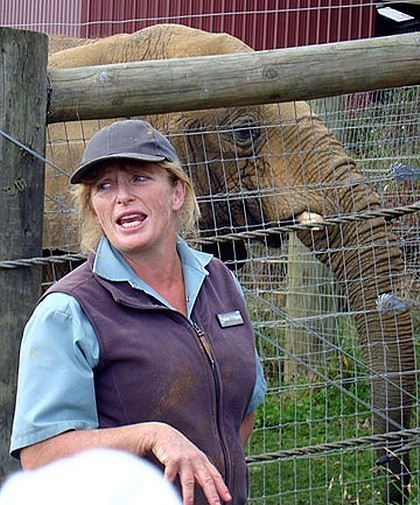 The elephant and her victim a few hours before the attackIn New Zealand, an elephant has killed the zoo owner who had been nursing her for two years. Various reports imply that the elephant, now named Mila, had been abused in the circus where she performed for decades. Abused elephants can exhibit symptoms like those of post-traumatic stress in humans. Helen Schofield was working to train Mila so she could someday join a herd of elephants.
The elephant and her victim a few hours before the attackIn New Zealand, an elephant has killed the zoo owner who had been nursing her for two years. Various reports imply that the elephant, now named Mila, had been abused in the circus where she performed for decades. Abused elephants can exhibit symptoms like those of post-traumatic stress in humans. Helen Schofield was working to train Mila so she could someday join a herd of elephants.Newspaper accounts have also mentioned that blasting had been going on in the area as part of construction. Some scientists have speculated that this sort of noise can cause elephants to attack. They hear in ranges more profound than our own and depend on the vibration of the ground for information we probably can't imagine.
'Panic-attack' elephant crushes zoo owner to death in trunk: "A zoo owner was crushed to death in an elephant’s trunk after the animal she had spent two years nursing back to health picked her up and lifted her into the air, New Zealand animal welfare authorities say."
Published on April 26, 2012 02:15
April 25, 2012
Death Stories: Heartless
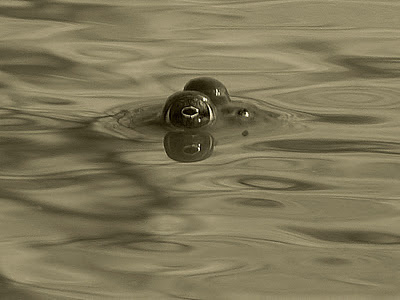 Photo by Dee Puett
Photo by Dee PuettOpen the Pericardium widely from in front. Study its interior (Middle Mediastinum) and note the reflections of its serous layer onto the great vessels. Take a blunt-pointed pair of scissors and split the Pericardium up to each of the great blood vessels and trim it away from around each of them. Be especially careful not to injure the Inferior Vena Cava (postcava) when freeing it. It is safer to leave intact that portion of the Pericardium which is attached to the left border of its opening in the diaphragm, along with the portion that is attached to the upper surface of the diaphragm. Otherwise, remove all of the Pericardium. Do not remove the heart and do not cut it open. It must be kept intact and in its place. Use another specimen for comparison and for the study of the interior of the heart.
--from an antique manual on dissection
Lena came in with a heart in her hand.
It was a humid 95. I and four or five friends, all of us poor college students, were pooling our resources to come up with a decent meal. Lena and Nate had gone to the creek and gigged bullfrogs while I stayed behind to clean up the kitchen; it was my policy in those days to wash dishes at least once a month.
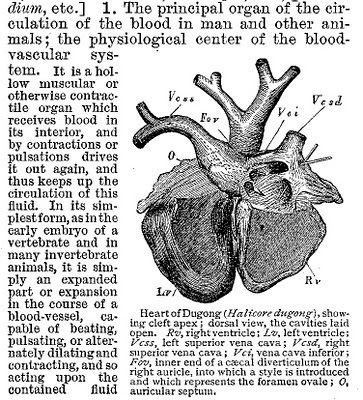 Lena had never eaten frog before, and she was struck with wonder at the whole process. She came in from the patio where she and Nate were skinning the frogs. “Look at this,” she said. The frog heart in her hand beat, heaving itself against the air. She poked it with her finger; it kept beating.
Lena had never eaten frog before, and she was struck with wonder at the whole process. She came in from the patio where she and Nate were skinning the frogs. “Look at this,” she said. The frog heart in her hand beat, heaving itself against the air. She poked it with her finger; it kept beating.“So?” I said irritably, scrubbing at a crusted skillet.
“It’s still beating. I didn’t know they did that.”
“Of course they do. Didn’t you take high school biology?” I thought back to my first frog dissection--the stink of formaldehyde, like nausea and cold and lilacs together; the delicate work of chipping away the skull to get the brain out intact, its thick optic nerves anchoring it to the eyes, which were larger than the brain itself. The eyes, when severed, would bounce like rubber balls. In the stomach I found an entire beetle, thick and shining and black and over an inch long. The liver felt like cold velvet.
Of course, the highlight of the dissection was the shock: The teacher touched an electric probe to the thigh muscle, and the leg spasmed. He made a circuit of the limbs: all of them moved to the electric touch. The frog must have been dead for weeks, but when the probe spoke, the muscles still answered.
I remained, while the storm lasted, watching its progress with curiosity and delight. As I stood at the door, on a sudden I beheld a stream of fire issue from an old and beautiful oak which stood about twenty yards from our house; and so soon as the dazzling light vanished, the oak had disappeared, and nothing remained but a blasted stump. When we visited it the next morning, we found the tree shattered in a singular manner. It was not splintered by the shock, but entirely reduced to thin ribbons of wood. I never beheld anything so utterly destroyed.
A man of great research in natural philosophy was with us, and excited by this catastrophe, he entered on the explanation of a theory which he had formed on the subject of electricity and galvanism, which was at once new and astonishing to me.
--from Frankenstein
Mary Shelley
Lena went back outside, annoyed with my failure to wonder. I went back to my dishes. A moment later I heard the back door open again. I turned and saw my friends, and one of them was holding something wet and red and staring that leaped up and had to be held back. I leaped too, and Lena was happy with my humbling.
It was a bullfrog, of course, big as a football, still scrambling to escape even though it had been gigged and clubbed and skinned and gutted. Its heart lay on the counter beating. Its bloody striated muscles pushed against the hands holding it.
The legs tried to jump out of the frying pan. We served them on a bed of rice.
This story originally appeared in Food Chain.
Published on April 25, 2012 04:30
April 24, 2012
Rabid Bear Attack in Virginia
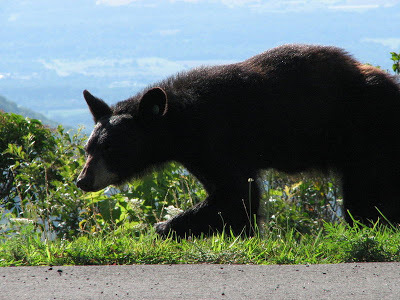 IceDragonSniper/Creative Commons
IceDragonSniper/Creative CommonsThis attack is interesting because rabies is rare among bears. Being mostly loners, they are at less risk than a social animal like a bat or a dog is.
Not your average bear: The rabid, harrowing attack on Afton Mountain | The Hook - Charlottesville's weekly newspaper, news magazine:
""The bear starts chasing us around the Gator," recounts Bryant. "I had the gun, and I wasn't able to get a shot off. Patrick jumps on the roof. I tossed it to him, going, 'Shoot him.' The bear was right behind me trying to eat me."
A single shot rang out.
"The bear was killed on the back of the Gator," says Bryant. "It happened so fast. It was so unreal."
"Patrick pushed me out of the way with his left arm," says Bryant. "He fired with one arm like a pistol. It hurt his arm.""
Published on April 24, 2012 08:00
April 23, 2012
Shark Attack: Great White Kills Body Boarder
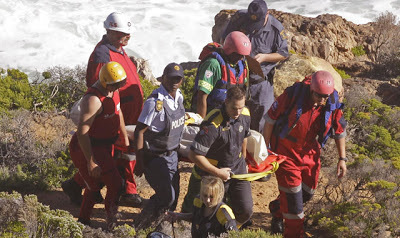
Shark Attack: Body Boarder Dies Off Cape Town As Wildlife Crew Told To Stop Putting Chum In Water | World News | Sky News:
"A documentary film crew which was luring sharks with bait in waters off Cape Town has been forced to stop after a champion bodyboarder was killed by a great white.
David Lilienfeld, 20, who lived in the city, was in the water in Gordon's Bay when his leg was bitten off by an animal about 5m (16ft) long, South Africa's National Sea Rescue Institute said.
"There are no other bite marks or lacerations on the deceased man's body - only the complete amputation of the right leg and the leg has not been recovered," it said."
Published on April 23, 2012 03:13
April 22, 2012
Mark Twain's River

Inspired by Mark Dery's chapter on Twain in I Must Not Think Bad Thoughts: Drive-by Essays on American Dread, American Dreams
 , I present another glorious bit of Twain's word art. This one's my own choice, rather than Dery's, and it comes from Life on the Mississippi. Twain describes the change that came over him after he'd learned the craft of piloting a steamboat.
, I present another glorious bit of Twain's word art. This one's my own choice, rather than Dery's, and it comes from Life on the Mississippi. Twain describes the change that came over him after he'd learned the craft of piloting a steamboat. Now when I had mastered the language of this water and had come to know every trifling feature that bordered the great river as familiarly as I knew the letters of the alphabet, I had made a valuable acquisition. But I had lost something, too. I had lost something which could never be restored to me while I lived. All the grace, the beauty, the poetry had gone out of the majestic river! I still keep in mind a certain wonderful sunset which I witnessed when steamboating was new to me. A broad expanse of the river was turned to blood; in the middle distance the red hue brightened into gold, through which a solitary log came floating, black and conspicuous; in one place a long, slanting mark lay sparkling upon the water; in another the surface was broken by boiling, tumbling rings, that were as many-tinted as an opal; where the ruddy flush was faintest, was a smooth spot that was covered with graceful circles and radiating lines, ever so delicately traced; the shore on our left was densely wooded, and the somber shadow that fell from this forest was broken in one place by a long, ruffled trail that shone like silver; and high above the forest wall a clean-stemmed dead tree waved a single leafy bough that glowed like a flame in the unobstructed splendor that was flowing from the sun. There were graceful curves, reflected images, woody heights, soft distances; and over the whole scene, far and near, the dissolving lights drifted steadily, enriching it, every passing moment, with new marvels of coloring.
I stood like one bewitched. I drank it in, in a speechless rapture. The world was new to me, and I had never seen anything like this at home. But as I have said, a day came when I began to cease from noting the glories and the charms which the moon and the sun and the twilight wrought upon the river's face; another day came when I ceased altogether to note them. Then, if that sunset scene had been repeated, I should have looked upon it without rapture, and should have commented upon it, inwardly, after this fashion: This sun means that we are going to have wind to-morrow; that floating log means that the river is rising, small thanks to it; that slanting mark on the water refers to a bluff reef which is going to kill somebody's steamboat one of these nights, if it keeps on stretching out like that; those tumbling 'boils' show a dissolving bar and a changing channel there; the lines and circles in the slick water over yonder are a warning that that troublesome place is shoaling up dangerously; that silver streak in the shadow of the forest is the 'break' from a new snag, and he has located himself in the very best place he could have found to fish for steamboats; that tall dead tree, with a single living branch, is not going to last long, and then how is a body ever going to get through this blind place at night without the friendly old landmark.
No, the romance and the beauty were all gone from the river. All the value any feature of it had for me now was the amount of usefulness it could furnish toward compassing the safe piloting of a steamboat. Since those days, I have pitied doctors from my heart. What does the lovely flush in a beauty's cheek mean to a doctor but a 'break' that ripples above some deadly disease. Are not all her visible charms sown thick with what are to him the signs and symbols of hidden decay? Does he ever see her beauty at all, or doesn't he simply view her professionally, and comment upon her unwholesome condition all to himself? And doesn't he sometimes wonder whether he has gained most or lost most by learning his trade?
Incidentally, that's a painting by Caspar David Friedrich at the top. In my last Twain post, I preferred George Inness as the artist of the storm. Here's Inness handling the river-twilight theme:
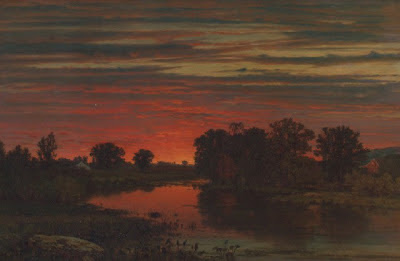
Published on April 22, 2012 09:00
April 21, 2012
The Elephant's Child
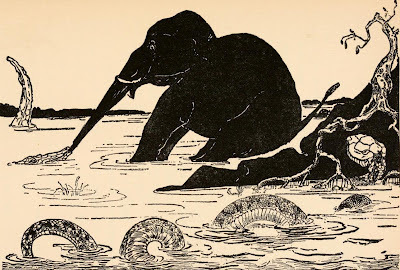
There's a cute Kipling story (below) about what happens when a crocodile meets an elephant. In real life, it's not so cute. It seems to happen when the crocodile mistakes the elephant's trunk for a snake or some such viable prey. It doesn't usually go well for the croc, who is likely to get stomped to death. Here, the presence of the elephant's calf complicates matters.
THE ELEPHANT'S CHILD
by Rudyard Kipling
IN the High and Far-Off Times the Elephant, O Best Beloved, had no trunk. He had only a blackish, bulgy nose, as big as a boot, that he could wriggle about from side to side; but he couldn't pick up things with it. But there was one Elephant—a new Elephant—an Elephant's Child—who was full of 'satiable curtiosity, and that means he asked ever so many questions. And he lived in Africa, and he filled all Africa with his 'satiable curtiosities. He asked his tall aunt, the Ostrich, why her tail-feathers grew just so, and his tall aunt the Ostrich spanked him with her hard, hard claw. He asked his tall uncle, the Giraffe, what made his skin spotty, and his tall uncle, the Giraffe, spanked him with his hard, hard hoof. And still he was full of 'satiable curtiosity! He asked his broad aunt, the Hippopotamus, why her eyes were red, and his broad aunt, the Hippopotamus, spanked him with her broad, broad hoof; and he asked his hairy uncle, the Baboon, why melons tasted just so, and his hairy uncle, the Baboon, spanked him with his hairy, hairy paw. And still he was full of 'satiable curtiosity! He asked questions about everything that he saw, or heard, or felt, or smelt, or touched, and all his uncles and his aunts spanked him. And still he was full of 'satiable curtiosity!
One fine morning in the middle of the Precession of the Equinoxes this 'satiable Elephant's Child asked a new fine question that he had never asked before. He asked, 'What does the Crocodile have for dinner?' Then everybody said, 'Hush!' in a loud and dretful tone, and they spanked him immediately and directly, without stopping, for a long time.
By and by, when that was finished, he came upon Kolokolo Bird sitting in the middle of a wait-a-bit thorn-bush, and he said, 'My father has spanked me, and my mother has spanked me; all my aunts and uncles have spanked me for my 'satiable curtiosity; and still I want to know what the Crocodile has for dinner!'
Then Kolokolo Bird said, with a mournful cry, 'Go to the banks of the great grey-green, greasy Limpopo River, all set about with fever-trees, and find out.'
That very next morning, when there was nothing left of the Equinoxes, because the Precession had preceded according to precedent, this 'satiable Elephant's Child took a hundred pounds of bananas (the little short red kind), and a hundred pounds of sugar-cane (the long purple kind), and seventeen melons (the greeny-crackly kind), and said to all his dear families, 'Goodbye. I am going to the great grey-green, greasy Limpopo River, all set about with fever-trees, to find out what the Crocodile has for dinner.' And they all spanked him once more for luck, though he asked them most politely to stop.
Then he went away, a little warm, but not at all astonished, eating melons, and throwing the rind about, because he could not pick it up.
He went from Graham's Town to Kimberley, and from Kimberley to Khama's Country, and from Khama's Country he went east by north, eating melons all the time, till at last he came to the banks of the great grey-green, greasy Limpopo River, all set about with fever-trees, precisely as Kolokolo Bird had said.
Now you must know and understand, O Best Beloved, that till that very week, and day, and hour, and minute, this 'satiable Elephant's Child had never seen a Crocodile, and did not know what one was like. It was all his 'satiable curtiosity.
The first thing that he found was a Bi-Coloured-Python-Rock-Snake curled round a rock.
''Scuse me,' said the Elephant's Child most politely, 'but have you seen such a thing as a Crocodile in these promiscuous parts?'
'Have I seen a Crocodile?' said the Bi-Coloured-Python-Rock-Snake, in a voice of dretful scorn. 'What will you ask me next?'
''Scuse me,' said the Elephant's Child, 'but could you kindly tell me what he has for dinner?'
Then the Bi-Coloured-Python-Rock-Snake uncoiled himself very quickly from the rock, and spanked the Elephant's Child with his scalesome, flailsome tail.
'That is odd,' said the Elephant's Child, 'because my father and my mother, and my uncle and my aunt, not to mention my other aunt, the Hippopotamus, and my other uncle, the Baboon, have all spanked me for my 'satiable curtiosity—and I suppose this is the same thing.
So he said good-bye very politely to the Bi-Coloured-Python-Rock-Snake, and helped to coil him up on the rock again, and went on, a little warm, but not at all astonished, eating melons, and throwing the rind about, because he could not pick it up, till he trod on what he thought was a log of wood at the very edge of the great grey-green, greasy Limpopo River, all set about with fever-trees.
But it was really the Crocodile, O Best Beloved, and the Crocodile winked one eye—like this!
''Scuse me,' said the Elephant's Child most politely, 'but do you happen to have seen a Crocodile in these promiscuous parts?'
Then the Crocodile winked the other eye, and lifted half his tail out of the mud; and the Elephant's Child stepped back most politely, because he did not wish to be spanked again.
'Come hither, Little One,' said the Crocodile. 'Why do you ask such things?'
''Scuse me,' said the Elephant's Child most politely, 'but my father has spanked me, my mother has spanked me, not to mention my tall aunt, the Ostrich, and my tall uncle, the Giraffe, who can kick ever so hard, as well as my broad aunt, the Hippopotamus, and my hairy uncle, the Baboon, and including the Bi-Coloured-Python-Rock-Snake, with the scalesome, flailsome tail, just up the bank, who spanks harder than any of them; and so, if it's quite all the same to you, I don't want to be spanked any more.'
'Come hither, Little One,' said the Crocodile, 'for I am the Crocodile,' and he wept crocodile-tears to show it was quite true.
Then the Elephant's Child grew all breathless, and panted, and kneeled down on the bank and said, 'You are the very person I have been looking for all these long days. Will you please tell me what you have for dinner?'
'Come hither, Little One,' said the Crocodile, 'and I'll whisper.'
Then the Elephant's Child put his head down close to the Crocodile's musky, tusky mouth, and the Crocodile caught him by his little nose, which up to that very week, day, hour, and minute, had been no bigger than a boot, though much more useful.
'I think, said the Crocodile—and he said it between his teeth, like this—'I think to-day I will begin with Elephant's Child!'
At this, O Best Beloved, the Elephant's Child was much annoyed, and he said, speaking through his nose, like this, 'Led go! You are hurtig be!'
Then the Bi-Coloured-Python-Rock-Snake scuffled down from the bank and said, 'My young friend, if you do not now, immediately and instantly, pull as hard as ever you can, it is my opinion that your acquaintance in the large-pattern leather ulster' (and by this he meant the Crocodile) 'will jerk you into yonder limpid stream before you can say Jack Robinson.'
This is the way Bi-Coloured-Python-Rock-Snakes always talk.
Then the Elephant's Child sat back on his little haunches, and pulled, and pulled, and pulled, and his nose began to stretch. And the Crocodile floundered into the water, making it all creamy with great sweeps of his tail, and he pulled, and pulled, and pulled.
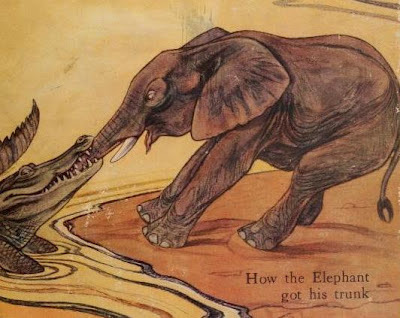
And the Elephant's Child's nose kept on stretching; and the Elephant's Child spread all his little four legs and pulled, and pulled, and pulled, and his nose kept on stretching; and the Crocodile threshed his tail like an oar, and he pulled, and pulled, and pulled, and at each pull the Elephant's Child's nose grew longer and longer—and it hurt him hijjus!
Then the Elephant's Child felt his legs slipping, and he said through his nose, which was now nearly five feet long, 'This is too butch for be!'
Then the Bi-Coloured-Python-Rock-Snake came down from the bank, and knotted himself in a double-clove-hitch round the Elephant's Child's hind legs, and said, 'Rash and inexperienced traveller, we will now seriously devote ourselves to a little high tension, because if we do not, it is my impression that yonder self-propelling man-of-war with the armour-plated upper deck' (and by this, O Best Beloved, he meant the Crocodile), 'will permanently vitiate your future career.
That is the way all Bi-Coloured-Python-Rock-Snakes always talk.
So he pulled, and the Elephant's Child pulled, and the Crocodile pulled; but the Elephant's Child and the Bi-Coloured-Python-Rock-Snake pulled hardest; and at last the Crocodile let go of the Elephant's Child's nose with a plop that you could hear all up and down the Limpopo.
Then the Elephant's Child sat down most hard and sudden; but first he was careful to say 'Thank you' to the Bi-Coloured-Python-Rock-Snake; and next he was kind to his poor pulled nose, and wrapped it all up in cool banana leaves, and hung it in the great grey-green, greasy Limpopo to cool.
'What are you doing that for?' said the Bi-Coloured-Python-Rock-Snake.
''Scuse me,' said the Elephant's Child, 'but my nose is badly out of shape, and I am waiting for it to shrink.
'Then you will have to wait a long time, said the Bi-Coloured-Python-Rock-Snake. 'Some people do not know what is good for them.'
The Elephant's Child sat there for three days waiting for his nose to shrink. But it never grew any shorter, and, besides, it made him squint. For, O Best Beloved, you will see and understand that the Crocodile had pulled it out into a really truly trunk same as all Elephants have to-day.
At the end of the third day a fly came and stung him on the shoulder, and before he knew what he was doing he lifted up his trunk and hit that fly dead with the end of it.
''Vantage number one!' said the Bi-Coloured-Python-Rock-Snake. 'You couldn't have done that with a mere-smear nose. Try and eat a little now.'
Before he thought what he was doing the Elephant's Child put out his trunk and plucked a large bundle of grass, dusted it clean against his fore-legs, and stuffed it into his own mouth.
'Vantage number two!' said the Bi-Coloured-Python-Rock-Snake. 'You couldn't have done that with a mear-smear nose. Don't you think the sun is very hot here?'
'It is,' said the Elephant's Child, and before he thought what he was doing he schlooped up a schloop of mud from the banks of the great grey-green, greasy Limpopo, and slapped it on his head, where it made a cool schloopy-sloshy mud-cap all trickly behind his ears.
'Vantage number three!' said the Bi-Coloured-Python-Rock-Snake. 'You couldn't have done that with a mere-smear nose. Now how do you feel about being spanked again?'
''Scuse me,' said the Elephant's Child, 'but I should not like it at all.'
'How would you like to spank somebody?' said the Bi-Coloured-Python-Rock-Snake.
'I should like it very much indeed,' said the Elephant's Child.
'Well,' said the Bi-Coloured-Python-Rock-Snake, 'you will find that new nose of yours very useful to spank people with.'
'Thank you,' said the Elephant's Child, 'I'll remember that; and now I think I'll go home to all my dear families and try.'
So the Elephant's Child went home across Africa frisking and whisking his trunk. When he wanted fruit to eat he pulled fruit down from a tree, instead of waiting for it to fall as he used to do. When he wanted grass he plucked grass up from the ground, instead of going on his knees as he used to do. When the flies bit him he broke off the branch of a tree and used it as fly-whisk; and he made himself a new, cool, slushy-squshy mud-cap whenever the sun was hot. When he felt lonely walking through Africa he sang to himself down his trunk, and the noise was louder than several brass bands.
He went especially out of his way to find a broad Hippopotamus (she was no relation of his), and he spanked her very hard, to make sure that the Bi-Coloured-Python-Rock-Snake had spoken the truth about his new trunk. The rest of the time he picked up the melon rinds that he had dropped on his way to the Limpopo—for he was a Tidy Pachyderm.
One dark evening he came back to all his dear families, and he coiled up his trunk and said, 'How do you do?' They were very glad to see him, and immediately said, 'Come here and be spanked for your 'satiable curtiosity.'
'Pooh,' said the Elephant's Child. 'I don't think you peoples know anything about spanking; but I do, and I'll show you.' Then he uncurled his trunk and knocked two of his dear brothers head over heels.
'O Bananas!' said they, 'where did you learn that trick, and what have you done to your nose?'
'I got a new one from the Crocodile on the banks of the great grey-green, greasy Limpopo River,' said the Elephant's Child. 'I asked him what he had for dinner, and he gave me this to keep.'
'It looks very ugly,' said his hairy uncle, the Baboon.
'It does,' said the Elephant's Child. 'But it's very useful,' and he picked up his hairy uncle, the Baboon, by one hairy leg, and hove him into a hornet's nest.
Then that bad Elephant's Child spanked all his dear families for a long time, till they were very warm and greatly astonished. He pulled out his tall Ostrich aunt's tail-feathers; and he caught his tall uncle, the Giraffe, by the hind-leg, and dragged him through a thorn-bush; and he shouted at his broad aunt, the Hippopotamus, and blew bubbles into her ear when she was sleeping in the water after meals; but he never let any one touch Kolokolo Bird.
At last things grew so exciting that his dear families went off one by one in a hurry to the banks of the great grey-green, greasy Limpopo River, all set about with fever-trees, to borrow new noses from the Crocodile. When they came back nobody spanked anybody any more; and ever since that day, O Best Beloved, all the Elephants you will ever see, besides all those that you won't, have trunks precisely like the trunk of the 'satiable Elephant's Child.
Published on April 21, 2012 09:00
April 20, 2012
Sri Lanka : Crocodile Kills Two Women
 L. Shyamal/Creative Commons
L. Shyamal/Creative CommonsThis news report gives no detail about the species. The likely man-eater, on a purely statistical basis, is the saltwater crocodile. Sri Lanka also has mugger crocodiles, which are far less likely to take people--but it has happened. The photo shows a mugger with a painted stork.
Sri Lanka : Government grants relief to families of Sri Lanka crocodile attack victims:
"18-year-old school girl Nuwanthika Sathsaran . . . was dragged away by the animal when she was washing her face at the bank of the river.
A week earlier the same crocodile [took] a mother of three who was washing clothes at the river."
Published on April 20, 2012 08:00
April 19, 2012
Big Great White Shark Caught in Mexico
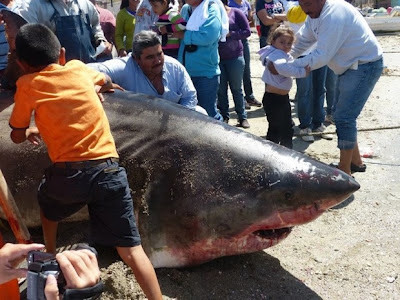
Fishermen based in Guaymas, Sonora, Mexico, brought in this massive great white shark. It was already dead when they encountered it; apparently it died after becoming entangled in the nets they had set for flounder.
As is usual in such cases, its size crept upwards as its image raced around the internet. Of the several websites I checked, the earliest had it at 5 meters--impressive, but hardly unprecedented. Others, however, are saying it's 6 meters long--nearly 20 feet. That would place it among the biggest great whites ever measured.
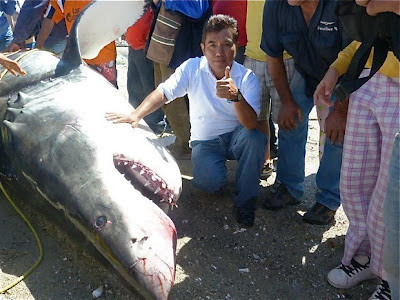
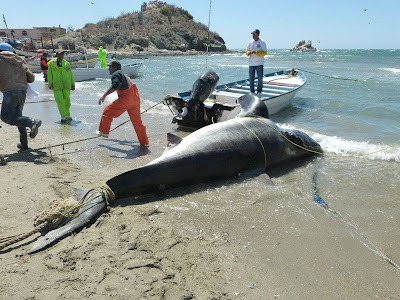
Published on April 19, 2012 03:00
April 18, 2012
Mule Deer Executed as Repeat Offender
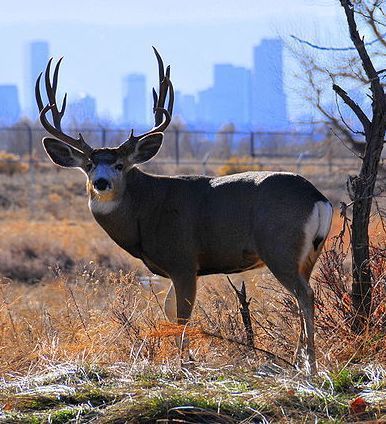
In Idaho, a wildlife officer killed a mule deer that was harassing marmot-hunters, possibly the same buck that attacked a woman last September. The wildlife people suspect the deer had been reared by humans, which would explain its atrocious manners. But see my skeptical comments about that theory, which I posted after the earlier attack.
Fish and Game Kills Aggressive Deer - Local News Story - KIFI Idaho Falls:
"Priestley said he walked ahead of the boys a short distance when a mule deer buck jumped up about 30 yards away and started to run toward him.
The deer circled to the man’s right, but still kept running toward him.
Priestley threw a rock at the deer when it got within 10 yards, hitting it on the side. The deer hopped about 15 yards away, where it stopped to rake its head on some sagebrush.
Then the buck turned back toward Priestley, getting within 6 to 8 feet before it stopped. The buck stomped once, and then began raking its head in the brush again."
Published on April 18, 2012 04:30
April 17, 2012
Swan Kills Man

In several recorded cases, swans have killed small children. This report marks the first time I've heard of a swan killing a grown man. But as readers of The Book of Deadly Animals will recall, territorial aggression is a male swan's default setting.
A swan generally attacks by striking with the bony knobs on the front of its wings. In at least one case of aggression against a child, the swan seemed to deliberately hold its victim underwater to drown him. That may explain the Illinois man's death.
'Killer' swan attacks, pursues a Chicago-area man until he drowns - latimes.com:
Swans "are territorial and can be quite aggressive when threatened. This aggression makes them good at driving off geese; it can also lead to tragedy.
Anthony Hensley was a 37-year-old married father of two who worked for a company that uses dogs and swans to shoo pesky geese from properties in the area. Hensley had taken to a kayak Sunday morning to check on the swans in a Des Plaines-area pond when one of the larger birds turned on him, the Chicago Sun-Times reported.
Cook County sheriff’s investigators believe Hensley either got too close to the swan or the swan’s nesting area."
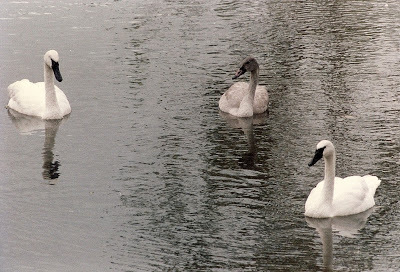
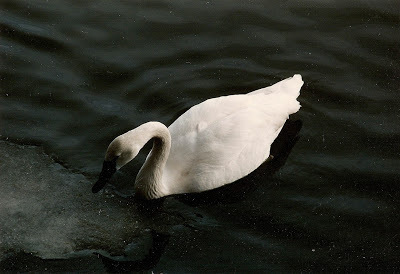
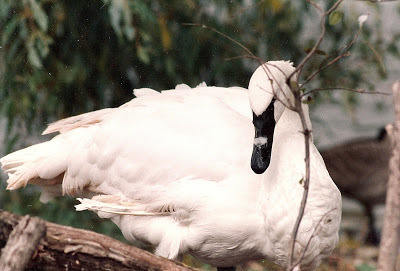
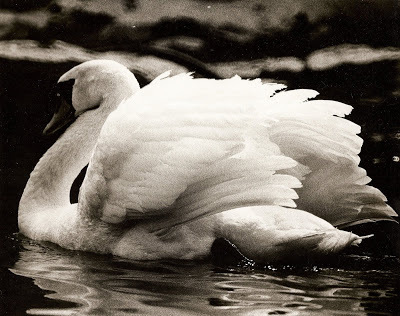
Photography by Wayne T. Allison
Published on April 17, 2012 04:30



